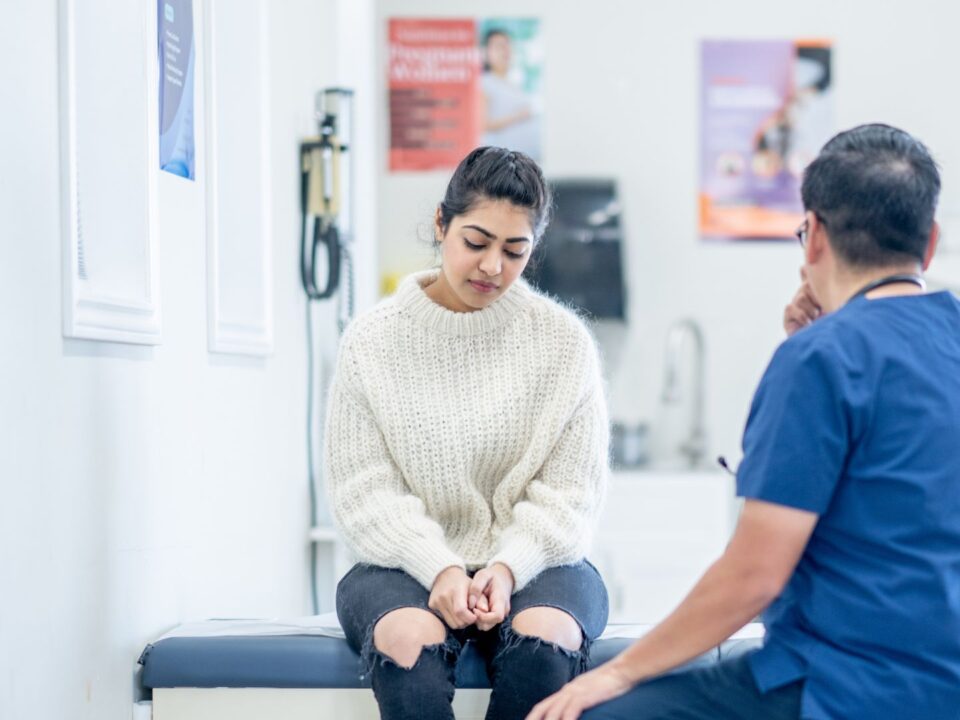
How Much Does Residential Mental Health Treatment Cost in Indianapolis?
April 16, 2025
Can Intensive Outpatient Program in Indianapolis Be Customized for High-Functioning Mental Health Conditions?
April 21, 2025Many people struggle with both mental health challenges and addiction issues. Residential mental health facilities in Indiana offer specialized care for individuals facing these co-occurring disorders.
This article will explore how these facilities address dual diagnosis treatment, therapies, and personalized plans. Keep reading to understand your options for comprehensive care.
Key Takeaways
- Residential mental health facilities in Indiana offer dual diagnosis treatment for both mental health and addiction issues, often through Intensive Outpatient Programs (IOPs) lasting 30 to 35+ days.
- These programs combine therapies like CBT, DBT, group therapy, and holistic methods such as yoga and meditation into individualized care plans.
- Patients can take part in IOPs while living at home or in sober housing, providing flexibility with daily responsibilities during recovery.
- Facilities focus on treating co-occurring disorders simultaneously by addressing root causes through coordinated therapy and medication management.
- The admission process includes screenings, assessments with therapists, insurance verification, eligibility reviews, and customized program options for care across Indiana.
Do Residential Mental Health Facilities in Indiana Provide Dual Diagnosis Treatment?
Residential mental health Indianapolis provides dual diagnosis treatment for individuals facing both mental health and substance abuse issues. These programs address disorders such as anxiety, bipolar disorder, and addiction within the same care plan.
Facilities often include structured Intensive Outpatient Programs (IOPs) lasting 30 to 35+ days, offering therapy, skill-building, and psychoeducation.
Patients can choose to live at home or in community housing while attending IOPs. “Comprehensive dual diagnosis care helps individuals rebuild their lives step by step,” said a local mental health therapist with experience in Indianapolis.
Treatment focuses on recovery through personalized programs created for co-occurring conditions.
How Do Residential Mental Health Facilities in Indiana Address Co-Occurring Mental Health and Addiction Disorders?
Facilities in Indiana use integrated treatment approaches to address co-occurring disorders. They combine therapies for mental health treatment in Indianapolis and addiction into one coordinated plan. Intensive Outpatient Programs (IOPs) play a significant role in these efforts.
These programs usually last 30 to 35 days or longer, helping individuals transition from more intensive care settings. While enrolled, participants live at home or in sober housing options that promote recovery.
IOP services include individual therapy, group sessions, medication management, and life skills training.
Treatment plans focus on holistic healing by treating the mind and body as one system. Facilities emphasize addressing the root causes of both conditions simultaneously rather than separately.
Comprehensive care allows patients to continue their daily routines while receiving personalized support specific to their needs. Key cities like Indianapolis offer access to leading residential mental health facilities with expertise in dual diagnosis treatment, benefiting those needing specialized assistance for complex cases involving substance abuse and mental illness combined.
What Types of Therapies Are Offered for Both Mental Health and Addiction Issues in Residential Facilities in Indiana?
Residential mental health facilities in Indiana offer several therapy options to treat co-occurring mental health and addiction disorders. These programs aim to provide comprehensive care through evidence-based methods and holistic approaches.
- Cognitive Behavioral Therapy (CBT) helps individuals identify and change negative thought patterns contributing to mental health and addiction issues.
- Dialectical Behavior Therapy (DBT) teaches skills like emotional regulation, distress tolerance, and mindfulness for better coping mechanisms.
- Individual therapy sessions focus on personal challenges, offering one-on-one support from licensed therapists.
- Group therapy creates a supportive environment where participants share experiences and learn from others facing similar issues.
- Psychoeducation sessions provide knowledge about mental health conditions, addiction triggers, and relapse prevention strategies.
- Skill-building activities enhance life skills like communication, decision-making, and self-care for sustainable recovery.
- Holistic therapies such as yoga, meditation, and art therapy promote physical relaxation and emotional balance during treatment.
Residential mental health treatment combines these approaches to address both conditions effectively.
Are There Specialized Programs for Individuals with Both Mental Health and Addiction Issues in Indiana?
Intensive Outpatient Programs (IOPs) in Indiana provide specialized care for individuals facing both mental health and substance abuse challenges. These programs typically last 30 to 35+ days, offering structured sessions three to four times a week.
Each session lasts about three hours and allows participants to maintain daily responsibilities while receiving residential mental health treatment.
Facilities in Indianapolis also offer dual diagnosis services that include individual therapy, group therapy, and medication management. IOPs are ideal as transitional steps after more intensive care like Partial Hospitalization Programs (PHP).
This approach provides targeted support without requiring round-the-clock supervision, addressing unique needs effectively.
The Adult Intensive Outpatient Program bridges the gap between high-level care and independent living for those with co-occurring disorders.
How Effective Are Residential Mental Health Facilities in Indiana at Treating Dual Diagnosis Patients?
Specialized programs in residential mental health facilities in Indiana have been effective for treating dual diagnosis patients. These facilities address both mental health disorders and substance abuse issues, offering comprehensive care.
Programs like Intensive Outpatient Programs (IOPs) allow patients to remain connected to their daily lives while receiving focused treatment. IOPs typically run 30-35 days or more, with sessions three to four days a week, lasting three to four hours each day.
This structure ensures that individuals receive consistent support without full-time residency. Mental health professionals, including psychologists and licensed social workers, are highly trained to handle complex dual diagnoses.
Therapies provided focus on recovery through individual counseling, group therapy, psychoeducation sessions, and skill-building activities. Residential settings also promote the use of holistic approaches by integrating various methods that target both conditions at once.
Facilities prioritize creating an environment where patients can transition smoothly between outpatient care and intensive residential treatment if needed. By combining expertise in addiction recovery with advanced mental health support systems, these centers establish an effective foundation for long-term healing and stability for residents across Indianapolis and broader Indiana communities seeking such services.
Can I Receive Customized Treatment for Both Mental Health and Addiction Issues in Indiana Residential Facilities?
Best mental health facilities in Indianapolis offer comprehensive care for both mental health and addiction issues. They provide dual diagnosis treatment customized to individual needs, addressing co-occurring disorders effectively.
Facilities in Indianapolis deliver services like therapy, medication management, and life skills training. Programs such as Intensive Outpatient Programs (IOPs) help maintain daily routines while attending structured sessions.
IOPs typically last 30 to 35 days and involve therapy sessions three to four times a week for about three hours each day. Patients can live at home or in sober housing during this period.
Residential programs also support severe cases with full-time assistance and specialized care options for dual diagnoses, ensuring thorough recovery plans are available across Indiana.
How Do Residential Mental Health Facilities in Indiana Integrate Substance Abuse and Mental Health Care?
Residential mental health facilities in Indiana integrate substance abuse and mental health care through specialized programs like Intensive Outpatient Programs (IOPs). These programs cater to adults dealing with both conditions simultaneously.
Facilities provide services such as individual therapy, group sessions, medication management, and skill-building activities. IOPs typically run 3 to 4 days a week for about 3 to 4 hours per session, offering flexibility for individuals balancing treatment with daily responsibilities.
Centers like First City Mental Health prioritize integrated care models. They focus on treating the root causes of co-occurring disorders while providing support throughout recovery.
Treatment lasts around 30-35+ days, depending on each participant’s needs. This approach ensures patients receive professional help without requiring full-time supervision but still benefit from structured guidance during this critical period.
What Is the Admission Process for Residential Mental Health Facilities in Indiana for Those with Both Mental Health and Addiction Issues?
Finding care for dual diagnosis in Indiana requires understanding the admission process. Each Indianapolis mental health facility may have unique steps, but most follow a similar structure.
- Contact the facility directly to inquire about services for dual diagnosis patients.
- Complete an initial screening, which covers both mental health and addiction history.
- Provide medical records, including past diagnoses or treatment plans.
- Submit insurance details to verify coverage.
- Schedule an in-depth assessment with a mental health therapist in Indianapolis or nearby areas.
- Work with admissions staff to review available programs suited for your needs.
- Discuss financial obligations and payment options if insurance does not cover all costs.
- Confirm acceptance into the program after meeting eligibility requirements.
- Receive details about check-in dates, schedules, and what items to bring during your stay.
Mental health facilities in Indianapolis emphasize personalized assessments for optimal care coordination.
Conclusion
Residential mental health facilities in Indiana provide comprehensive care for mental health and addiction issues. These centers offer therapies, programs, and customized treatment plans to support recovery.
Their focus on dual diagnosis ensures patients receive the combined care they need. With expert mental health therapist in Indianpolis from First City Mental Health and effective strategies, these facilities help individuals achieve lasting wellness.
FAQs
1. Do residential mental health facilities in Indiana treat both mental health and addiction issues?
Yes, many residential mental health facilities in Indiana provide care for both mental health conditions and addiction issues through integrated treatment programs.
2. Where can I find the best mental health facilities in Indianapolis?
You can explore some of the best mental health facilities in Indianapolis by researching centers that specialize in comprehensive care, including therapy and dual-diagnosis treatment.
3. Can a mental health therapist in Indianapolis help with addiction recovery?
Yes, a qualified mental health therapist in Indianapolis often works with individuals facing both emotional challenges and substance use disorders to create personalized recovery plans.
4. What services do residential mental health facilities offer near Indianapolis?
Residential mental health facilities near Indianapolis typically provide 24/7 support, individual counseling, group therapy sessions, and specialized programs for those dealing with co-occurring disorders like addiction.






